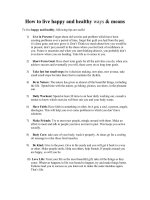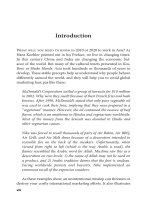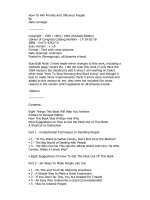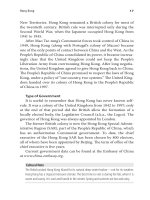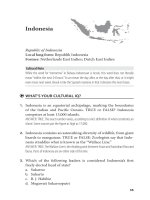how to act like a ceo 10 rules for getting to the top and staying there phần 5 ppt
Bạn đang xem bản rút gọn của tài liệu. Xem và tải ngay bản đầy đủ của tài liệu tại đây (126.32 KB, 22 trang )
Was it due to our inefficiencies in any form?
The answers to these three questions help me to determine my
next step. Do we go to ‘Plan B’ or is a whole new strategic outlook
required,” says Christian. “I concentrate on remaining calm, not al-
lowing worry to fester in my mind, always remembering that ‘worry
is like a rocking chair—it keeps on going but gets me nowhere.’”
“You can get quite complicated in stragegic planning: checking
the numbers, seeing where to make it grow, looking at the five year
forecast, and running models,” says Jerry Henry, CEO of John-
Manville. “In reality nine out of ten decisions are made based on
judgment, instinct, intuition, and taking your heart in your hand and
going for it.”
“My strategic plan is ‘here’s a cool idea, let’s do it.’ I seldom go
to the board with really thought through steps. My mind compart-
mentalizes how to get there. I think about order. And I drop enough
hints to the right people to build interest. Even getting them to think
it’s their idea. I go in with here’s the idea, here’s the steps, here’s
what it’s going to cost,” says one CEO.
Despite all these thoughts about your strategic planning, the truth
is, as Bill Stavropoulos, CEO of the Dow Chemical Company says,
“Strategy changes the moment you hit the battlefield. You have to
implement then constantly adapt and change. So be realistic but
also be optimistic.”
HOW TO ACT LIKE A CEO
70
CHAPTER 4
MAKE THE BIG PLAY
The CEO’s role in operations is to:
Delegate.
Communicate.
Plan for the mistakes.
Don’t let the desire to control everything get in the
way of doing what you’re best at. Give up the ego
and let go, for your own good.
— Robert L. Johnson
BET (Black Entertainment Television)
The CEO spends a lot of “fist on the chin” time with the “high
goals” of the corporate strategy: defining the metrics needed to be
looked at every day, making sure they are in place, questioning and
making decisions, building a process to avoid crisis, extrapolating
into the future, having a top team in place, providing resources to let
them do their work…but while doing all of this, the CEO can’t then
get sucked into the nitty-gritty details of being operations.
You need to be above the fray enough to stay focused on the
vision and the grand plan, so you have to effectively mobilize
your operations army toward the goals through your delegation.
71
Copyright 2001 Debra A. Benton. Click Here for Terms of Use
TEAMFLY
Team-Fly
®
To make the big play, you delegate but not abdicate. You, the
CEO, have a president, COO, or division heads for the “here-and-
now” operations. That’s their job. If your company is too small for
that, decide which role you’d going to play: inventor, builder, or op-
erator. You can’t be all three. You have to delegate something to oth-
ers—inside or outside.
People erroneously think the CEO has the power to run things.
Not so. The people with the power are in operations. (And even
more power is in the hands of the customer.) Operations make or
break the visionary strategic plan because they do or don’t execute.
(One CEO admitted, “When we send dumb stuff down, fortunately,
our front-line people are too smart to follow it.”)
There is so little the CEO can—or should we say, could—do in op-
erations, if good planning and good people are in place. “The CEO
should be able to go for a month vacation and not make one phone call
to the office. If he can’t he’s just a worker-bee, not a CEO,” says Jack
Falvey, CEO of Intermark. “But that doesn’t mean he doesn’t keep
track of what’s going on, keeping in touch even at the lowest level.”
The CEO is paid to see the big picture. Again, that’s where you
make the big play. The CEO must be free from the “administration
of little victories” (that is, moving the yellow file to the blue file)
to focus on the bigger thing. The effective CEO knows the details in
the big picture but just doesn’t do them—which is different from
getting his or her fingers dirty if necessary.
Operations is an area where you, as CEO, should honestly be able
to say, “not much happens that I don’t know,” and still be able to
take that “month vacation.” How? That’s part of the 1000 percent:
the act of delegating.
Delegating is one of those areas where if you don’t have the time
to do it right, you don’t have the time to do it over. If you’ve com-
HOW TO ACT LIKE A CEO
72
municated the vision and the plan, people know where you’re com-
ing from and what you want from them. They become an extension
of you in solving problems:
Choose what can be delegated
Here’s where you take your vision and strategy and put it into short-
and long-term direction for others to do. That means you have to re-
lease your control. The recommendation is that if someone else can
do it, get someone else to do it.
Just remember, all strategy, all management, all processes, all
systems, all decisions, and all efforts must serve the goals—either
interim or end goals.
Select who will do the things that need to be done
When you delegate (so you don’t abdicate), you always have to
know certain key things in every job. You have to know what
motivates people, in general, in that job. And you have to know
what information or “intelligence” is required for the job, in
other words, where the job might break down because there
is an “information” breakdown. With that knowledge, you can
delegate to the person/group who should be doing the job. As
much as possible, match the project with the employee’s skills
and desires.
It’s good to allow for some “stretch” that will help the employee
to grow and develop in his or her delegation. If necessary, give some
low-risk assignments to build confidence.
You obviously need to have competent people in the various cat-
egories you will be delegating: finance, engineering, research and
development (R&D), distribution, marketing, etc.
MAKE THE BIG PLAY
73
Clearly explain their target goals as it fits into
the grand plan
“Clarity jump-starts a successful result. I like to help people envi-
sion the end-state. The ‘what’ to be solved. Then leave the ‘how’
up to them. That way they own the execution,” says Al Yasalonis,
Nabisco Logistics Operations.
Frankly, the majority (that may not include you, of course) in so-
ciety wants to be told what to do. Let them know what is expected
as far as results and timing.
If a specific goal is superimportant and needs to be done now, tell
them that. Give a clear directive but with some background, if pos-
sible, so they understand “what and why” it needs to be done. If the
task is near impossible, do all you can to remove roadblocks so the
person can achieve success.
Give a “due date” and treat them like you would like to be treated
when given direction.
Let them do it
Expect them to be able to do it. They just might live up to your ex-
pectations. Wouldn’t you when others expected it of you?
Trusting people helps them trust you and be motivated. Distrust de-
motivates. Only if your direct reports are motivated will they be able
to enthusiastically inspire and instill trust in their direct reports so they
can motivate, inspire, and instill trust in their direct reports and on
down the line until everyone is committed to his or her responsibilities.
Even though you let people go and do the work that needs to be
done, you still want them to know they aren’t alone and abandoned.
You don’t get so “hands off ” that when problems occur it’s diffi-
cult to reengage with authenticity. “Make sure you don’t abdicate
your role in operations. The lack of operations focus looks like a
HOW TO ACT LIKE A CEO
74
lack of interest,” says Peter Mannetti, CEO of US West Wireless.
“When issues come up you can’t provide input needed. It’s sort of
like the husband who’s gone on business for six weeks then comes
home and takes over telling his wife how to run the house.”
You have to trust them to work well. The worst CEO says some
version of “come back to me after you’ve tied your shoes;” that
CEO is so involved in every detail that he or she really has no per-
spective and shows no trust in the people. If you’re going to dele-
gate, you can’t micromanage to death and second-guess.
Now you must be aware when this isn’t working, when the peo-
ple under you aren’t doing what they are supposed to be doing. So
you need two guidelines upfront:
1. Have a process to “elevate” certain issues. One CEO wanted
to know the top five customer’s activities at all times. He
wanted a monthly update on “where they are, where the com-
pany is with them, and where help is needed.” Even though
“delegated,” those customers were elevated to the CEO on a
regular basis.
2. Have an “exception reporting basis” where issues are brought
to your attention that you weren’t watching as closely but now
need to be aware of.
Stay on top of things
Have periodic status reports (for longer projects). It’s your respon-
sibility to track what you’ve delegated. You can do it one on one or
in a group. In a group you can go around the table, with each person
updating the others.
You can stay on top of things and still give people a free rein.
When you follow up, don’t be all over the person. Have a certain
amount of impatience but a certain amount of trust too.
MAKE THE BIG PLAY
75
A former CEO of Gillette used to invite himself on plant tours
when visiting field employees or when customers were taking a
tour. It was his way of walking around and listening to the floor peo-
ple without stepping into his middle managers “territory.” He could
see first hand what was going on without appearing to be “checking
up” on them.
Another CEO calls his telemarketing people and orders his own
products. He engages them in conversation with, “what’s the hottest
selling item?” and “what problems have you had with this or that
product?” and “where do you recommend I go for a product you
don’t have?”
Kikkoman Corporation’s CEO Yuzaburo Mogi likes to visit su-
permarkets to see his company’s soy sauce display. “I look at how
the products are displayed. I watch the shoppers compare different
brands. This is really the way to see what the market is like. You
have to see it with your own eyes,” says Mogi.
Like Bill Blount, CEO of Power Motive, says, “If the specific work
is something important to your company, you better be involved.”
(None of the previous examples means anything like one CEO
who stood in the doorway and stopped everyone who was leaving to
see if he or she had completed enough work to go home!)
When you see someone doing something particularly great, tell
the person. Rudy Tauscher, GM of Trump International Hotel and
Tower, says to the person, “You represent me and the property well.
Thank you.”
Although not delegating per se, I experienced this in Hong Kong
and thought it was an interesting example of the “chief ” staying on
top of things: We were having dinner at the Peninsula Hotel. The
waiter took our order, served it with the cowaiter, and the busboy
brought clean silverware. But when it came time to remove dirty
HOW TO ACT LIKE A CEO
76
plates, the manager of the restaurant did it. I said to the manager,
Andrew Tam, “In the United States the busboy picks up the dirty
plates not the manager.” He said, “I do it the opposite here. As I
clean the table, I hear about the food and service from the customer.
It’s the time to learn if they were unhappy.”
Have checks to measure progress
On a regular basis have a formal review that meets specific meas-
urements, goals, or checkpoints. Find out if anything is falling into
the “exception-reporting basis.”
“It’s like a football team driving down the field. It’s several
planned plays, not one,” says Mark Pasqurella, CEO of Crown
American Realty Trust. “My job is two things: the constant check
on how we’re moving towards our goal. And, checking where things
are bogging down and I can be of help.”
Keep control of resources
When people are busily doing, they aren’t always paying attention
to the big picture, especially the big “resources” picture, but you
must. That’s what you stay on top of when checking up on things.
You exert control here; this can’t be delegated.
Tauscher says, “When I talk to people and see what’s going on I
sometimes contradict myself. They have a budget but I tell them
I’ll bend, ‘I’ll find the purchase order to get something done.’ I’d
rather have 100 happy guests and one unhappy controller.”
An executive who worked for Harvey Golub, CEO of American
Express, told me the story of being in his office where he had two
4-inch-high piles of financials in front of him. He pointed to one
sheet in the middle of one pile and said, “These numbers don’t
match.” It was one-tenth off. But he noticed.
MAKE THE BIG PLAY
77
If you don’t control the resources, how are you going to make
money and stay in business?
Be able and willing to help (when asked)
Help solve problems, help with resources, help with timetables, or
help with ideas. Demonstrate your ability and willingness to work
in the trenches and get your hands in the mud. People need to know
you know what it takes to make it all happen and are willing to do
what’s necessary.
One CEO told me he makes sure he does the simple act of putting
on a nametag like the ones his workers wear when he is in the plant. It’s
a small gesture for them to see he does what is expected of them. Jeff
Bezos, CEO of Amazon.com, is known to work on the assembly line
when needed. Michael Eisner likes to test the latest Disney theme park
ride. NewsCorps’ Robert Murdoch “fiddles” with newspaper head-
lines. Jim Clark of Netscape would write code from 12 a.m. to 6 a.m.
“I can delegate real easily as long as I have confidence in my peo-
ple. They just give me an update. I don’t even get partly involved be-
cause then I end up with some ownership and that takes it away from
the ones who are making it happen. Now, when my director of mar-
keting has been out and will be for a few months and he asks me to
develop a sales contest for him, I will. I participate when they want
me to do certain things,” says Dan Amos, CEO of AFLAC. “And I get
involved when I don’t like what I see is happening. For instance, when
I got home the other day and was going through my mail I had a let-
ter from our company, like all customers get. It was addressed to
“Dear Mr. Daniel P. Amos.” Now everyone knows that is not person-
alized. I told my people it should be “Dear Dan” or “Dear Mr. Amos.”
And it was signed “Policy Holder Service.” Instead I told them I
wanted the person’s name. I just fine tune operations.”
HOW TO ACT LIKE A CEO
78
Plan for mistakes
Expect disappointment. You have to let people fail to let them learn.
Despite your careful watch, with delegating, mistakes will happen.
When you delegate, you give people the right to make mistakes.
When they do make mistakes, you have to hold them accountable
but without their job being jeopardized for it. Don’t embarrass
them. Do calm them down about it. Ease their fear of reprisal. (That
fear is the biggest cause of more mistakes.)
“Delegate the authority to accomplish a task along with the re-
sponsibility,” says Joan Gustofan, Vice President of 3M. That in-
cludes mistakes.
GE’s Jack Welch tells the story of his first job in Pittsfield, Mass-
achusetts, where he had a disaster and a plant blew up. He had to
go to Connecticut to see his boss and explain what had happened.
Instead of being irate, they were supportive and encouraging. “I
clearly learned you have to make mistakes. Here I’d blown up a
plant and I wasn’t fired. I wasn’t yelled at or even criticized.”
When you delegate and “read back” on a periodic basis, take
careful notice if someone is weak and needs to be “read back” on
more often.
“I hate to make mistakes. When you start you make nickel mis-
takes, then dollar mistakes, then $10,000 ones. But it’s still a mis-
take in evaluation, judgment, or execution. There is a high level I
hold myself to and I hate to make mistakes,” says John Krebbs,
CEO of Parker Album Company. He’s speaking for himself but my
guess is he doesn’t like them from his people either.
The CEO sets the example and hopefully inspires the people to
follow. When an error occurs: admit it, tell what’s being done to cor-
rect it, fix it, state how it will be avoided in the future, move on,
and try not to let it happen again. That’s if it’s an “honest mistake.”
MAKE THE BIG PLAY
79
Now, if it’s to challenge your authority, you have a different problem
than delegation.
The good news about mistakes is
If you run lean, you can afford more or bigger mistakes.
You usually mess up on something that you know the best, but
you became lax.
Mistakes are your best mentors because they are the sparks that
ignite new endeavors.
One evening, a group was gathered at the CEOs home. They had
just completed the building of a 240,000-square foot headquarters
building, on time, and on budget, and this was a “thank you” cele-
bration for the people involved. The CEO placed a $20 bill on the
floor in the center of the group and said, “Tell us the mistakes made
in this project and the best one gets the $20.” With some natural hes-
itancy at first, people volunteered various “insignificant” blunders.
But as the momentum built and people were seeing how the group
was learning from the slip-ups, more and more were offered and
people were actually having fun sharing their war stories. At the
end, the CEO asked his wife, “Who do you think should get the $20
bill?” She answered, “They all get one.” And they did.
The point of this story is that you learn from setbacks. By prepar-
ing for the inevitable, you create a culture ready, willing, and more
likely able to react.
“Just think, right now, all over the world there are people exer-
cising bad judgment. Somebody, right this minute, is probably mak-
ing the mistake of his life,” says comedian George Carlin.
Take responsibility for the outcome
When delegating: encourage, keep momentum, help solve prob-
lems, meet timetables, and stay within budget. Remain intimately
HOW TO ACT LIKE A CEO
80
familiar with operations Have reviews. Let operations people know
you are there with them. And remember, you are responsible for
anything that your people do. (That’s for the good and the bad, by
the way.)
Give employees credit for the work they do
Do the best you can to match the recognition with the project and
the employee or team. Your intellectual capital is your most valu-
able. Nurture it.
You take the blame; give them the credit.
CEO COMMUNICATIONS
To delegate well: Plan. Evaluate. Anticipate. But don’t “do it”
yourself.
Since you aren’t “doing it” yourself, you have to effectively com-
municate to get people to do it for you. That requires good commu-
nication when you delegate, check up, follow through, help recover
from mistakes, and run the operations in general. It needs to be direct,
open, matter of fact, appropriately humorous, and totally trusting.
Communication, and the lack of it, results in the biggest prob-
lems in the business world. You will be a more effective CEO
because of this skill than because of all others. Communication is
the desire but also the technique of tone and choice of word. It is the
most powerful tool you have to do well or do harm.
The tongue is but three inches long, yet it can kill a man six
feet high.
— Japanese proverb
“You can’t overcommunicate,” says Gary Lyons, CEO of Neu-
rocrine Biosciences. “People need to know they can talk freely
with you.”
MAKE THE BIG PLAY
81
TEAMFLY
Team-Fly
®
“Send me the 10 stupidest things we do,” shouts Carly Fiorina,
CEO of Hewlett-Packard, as she walks offstage at a company gath-
ering. “I’ll read it!”
That’s pretty clear CEO communication. As opposed to the
internal memo from a different CEO, “We know that communica-
tion is a problem but the company is not going to discuss it with
employees!”
Communication is one of those areas where people do it all of the
time and think they are pretty good at it, but others don’t necessar-
ily think so and the end result is a failure to communicate. The ef-
fective CEO can’t let that happen on his or her watch.
“I value open communication,” says Wynn Willard, President of
Planters Ltd. “If it isn’t there things clamp down and people can
get secretive. The CEO has to go out of his way to communicate—
up, down, and sideways. Everyone is entitled to raise their hand and
say ‘I need more.’”
A study by the National Association of Colleges and Employers
concluded that the ability to communicate ranked first among per-
sonal qualities of college graduates sought by employers, and I can
tell you for a fact that from the college graduate new hires to the
grizzled old (or young) CEOs, that does not change.
Today, we communicate via voicemail, e-mail, letters, memos,
web sites, video, audio files, printed documents, verbal conversa-
tions, and, of course, in meetings—department meetings, employee
meetings, new employee meetings, and the rest. (Note that having
all those meetings could be totally time consuming, albeit necessary
so have some of them where everyone remains standing and keeps
the meetings focused and short.)
According to a study by Pitney Bowes, workers send and receive,
on average, 201 messages of all types in one day. That’s a lot of ex-
HOW TO ACT LIKE A CEO
82
changing of thoughts, messages, and information. (Some 562 mil-
lion messages circulate via AOL each day.)
Effective CEO communication is getting the right information
to the right people at the right time. There can’t be any confusion
between intention and perception.
“One button lets me connect to all 150 sites via voicemail to talk
about the good things we or the industry is doing. I’ve found posi-
tive comments have to weigh 10 to 1. They also have to be and
sound truly positive that’s why I use voicemail attachments. I can at-
tach the source of the ‘positive’ statement, say a supplier reporting
good growth as a result of a store manager’s effort, and simply en-
hance the message. Every person wants to have good comments cir-
culated about them from the boss, tied to a genuine message from
an outside source,” says Robert Buhler, CEO and President of Open
Pantry Food Marts. “But I’m a big believer in written memos, not e-
mail alone. When put on paper, it translates into ‘wow, I better get
this done.’”
THE CEO IS ALSO CLO
(CHIEF LISTENING OFFICER)
CEO communication isn’t just dispensing information but hearing
it as well. You have to be the CLO too—chief listening officer.
Everything in this book should remind you of that: listen to yourself
and the person you want to be, listen to the world to find your vi-
sion, listen to the experts to shape your strategy, and listen to the
people who execute your grand plan.
“I listen four times to the amount I speak,” says Boston Celtics
Coach, Rick Pitino.
Listen, long enough so people involved feel heard, then stop.
Don’t listen endlessly. “There is a time when they hand the baton
MAKE THE BIG PLAY
83
back to you and you have to stand up and lead,” says Michael Tru-
fant, CEO of G & M Marine Inc. “Like a doctor, you can’t prescribe
until you diagnose.”
To practice better listening, just remember:
Be willing to hear.
Be committed to learning and improving from what you hear.
Be open to differences of opinion.
Be courteous and respectful in your response.
“I’m the best listener I know. I’m the best listener in the com-
pany. I really listen. I get 80 percent of my information from
listening. A lot of people listen because they are afraid they’ll
be attacked so they pay attention for self-protection. I don’t worry
about that. I seldom even refute anything said. I just ask a bunch
of questions. How can you do your job if you can’t listen and be
open to new information?” says Curt Carter, CEO of Gulbransen,
Inc. and America, Inc.
One female CEO who will remain anonymous had the most stel-
lar academic education I have ever seen. Advanced degrees from the
top Ivy League schools in the United States as well as the top
schools abroad. But she didn’t listen. She was more concerned with
how she presented the right words than taking into account what
others were saying or how her words were affecting people.
When you are trying to listen, don’t:
Try to read their mind; just absorb their words.
Be thinking of what you’re going to say next.
Selectively absorb just the parts you want to take in.
Interrupt and derail.
HOW TO ACT LIKE A CEO
84
Give a positive response when it’s really negative in your verbal
or nonverbal reaction.
Dream
“I listen to people. Divine what they are saying. Feed it back
to them in an organized fashion,” says Reuben Marks, Chairman,
CEO and President of Colgate Palmolive Company. That’s part of
your job.
Listen. Then, say little, but be sure what you do say carries
weight. The following guidelines will help you develop precise
communication fast.
Keep it simple and structured
Strive for the “soul of compactness” when you speak. Think about
the “sound bite” in the media business, where the interviewer
extracts a statement that has impact and makes it the headline.
A McKinsey & Company consultant was telling me about a
female client who works high up in the Clinton administration,
“She listens with her eyes. A lot goes in and not that much goes out.
She only lets you know what you need to know.”
Brief isn’t enough…
You have to have every word say the right thing
Author, Elmore Leonard, says, “I try to leave out the parts that peo-
ple skip.”
One CEO, who was known for being so brief, caused a little friendly
internal competition. One vice president e-mailed to a colleague “hey
I got a ‘Nice job’ from Joe today.” The colleague responded, “Well I got
a four-word complimentary message versus just those two words,”
whereupon a third chimed in, “Well I got five words today!”
MAKE THE BIG PLAY
85
“Each word seems to carry the burden of centuries. He weighs
it heavily, considers it again, and reluctantly releases it to his-
tory,” writes a Washington Post writer about Japanese Emperor
Akihito.
American humorist Henry Wheeler Shaw wrote in 1850, “The
more ideas a man has the fewer words he takes to express them.
Wise men never talk to make time; they talk to save it.”
Honestly, when was the last time you weighed every word care-
fully, reconsidered the words, and only then reluctantly released
them to become history? You don’t have to answer that out loud be-
cause I wouldn’t want to either!
Frequently, people act like they are listening when they aren’t at
all. Don’t let yourself get into that situation. Either listen or show
that you are or get out of that conversation.
Some people are able to frequently “chat” you up only to con-
sume your energy. That’s wasted listening. You can extricate your-
self from the situation with an honest comment, “We could talk all
day about this but I believe I have the key issues so lets get on with
making a decision.”
Be like a courtroom judge. Listen to all sides. Reflect. Then
be the last to speak. Not the first person to put out an opin-
ion. There is a time to listen and a time to act.
— Michael Trufant
CEO, G & M Marine Inc.
Naturally, if you don’t want others to waste your time, don’t
waste theirs. Get to the point. A company that distributes office sup-
plies described itself in a press release with these words, “we are a
leading supplier of nonproduction goods and services to corpora-
tions that value innovative procurement solutions.” They distribute
office supplies for gosh sakes.
HOW TO ACT LIKE A CEO
86
A time not to be too brief is while answering a question from
someone to which you’ve delegated. Say, for example, you could
answer with a one-word answer but don’t. Refrain. Explain a little
more than you’d like. It increases people’s comfort level when you
provide more details. You never want to look like you duck out on
tough questions or smooth over or move on with out dealing with
important issues.
When using “few” words, you need to think about their impact
first. Choose and use the right ones. When I listened to Leo Kiely,
CEO of Coors, I learned how he frames things. Instead of saying,
“What you should be asking me about…” he said, “Let me take you
someplace differently.” Instead of prefacing a comment with, “Let
me explain this to you…” He said, “Let me paint a picture that
might make sense to you.”
To make the big play requires effective communication. Com-
munication to delegate, to check on what was delegated, to correct
mistakes, and to reward successes. It’s preparation. It’s sort of like
the good shortstop who is waiting for the ball to be hit and is
considering all the places the ball could go so when it’s hit, he’s
already there.
Listen, first, and then give and take information:
Make communication two-way as much
of the time as possible
Anticipate what’s going on and engage in frequent dialogue. You get
the best results by encouraging people to discuss the “opportunity,
challenge, and what they think should be done” as you do too. It’s
a two-way street.
Now, you may be dealing with a problem and already have a so-
lution in your mind. That’s fine; a good CEO usually does. But you
MAKE THE BIG PLAY
87
all importantly reinforce to the people that you value their opinion
by asking them first and engaging in a two-way exchange about it.
Very often, it is easier and faster to delegate directly and specif-
ically with no debate. But if you want motivated support, you had
better not choose that approach too often.
Ask questions to clarify, verify, stay on track,
track others, and avoid assuming
And to not look like a “know it all.”
Answers to your questions direct you to the real questions you
should be asking in order to end up with the outcome you want to
achieve.
“Great leaders ask stimulating, provocative, and ‘mind-bending’
questions. Good questions indicate they are engaged, and they also
enhance planning or decision making. You end up respecting their
insights as well as appreciate their involvement,” says Mindy Credi,
Director of Executive Learning, PepsiCo.
“People used to come and talk to me and I thought they wanted
a decision,” says Jim Perrella, CEO of Ingersoll Rand. “It’s not my
job to give every decision. My job is to probe so they come up with
their own decision. I’m a constant questioner.”
Give people information based on how they need
to receive it, not just on how you like to give it
Regardless of your best intentions, you will be misunderstood.
Everyone perceives things differently. Do the best you can to con-
sider the variety of ways others may take something you say or ask.
Choose the best way possible to manage “what you send.” Then lis-
ten to their response to evaluate how they took it. But don’t assume
you know. Ask how they interpreted what you said.
HOW TO ACT LIKE A CEO
88
If you don’t ask them, they won’t ask their people and that
will go down the chain, resulting in total mutual mystification.
Even if you’re pretty sure you know how they interpreted some-
thing, ask.
The effective CEO today has to be able to “play” to all audiences.
That means personality types, cultures, and job functions.
When you do speak, be clear and concise
Don’t talk with a stream of consciousness. Don’t use fillers. Don’t
grandstand. Don’t assume. Do speak up. Speak out. And speak
clearly.
I had a car service in Los Angeles for a day of meetings so I was
talking with the driver between stops. Although a few movies stars
were sprinkled in, he mainly drove for CEOs. I asked when he ob-
serves them, which he can’t help but do from the front seat, what is
the more prevalent behavior he sees? “How few words they use,”
he said. “They are on the phone most of the time yet they have the
other people doing the talking. And they don’t seem rushed when
they talk. They act like they have time.”
Now, this was not a scientific survey but an observation from a
man who spends 10 hours a day driving CEOs around the city. At
the least, it’s an interesting observation and from my experience in-
terviewing CEOs, I’d say he’s on target.
Never talk to someone as if you’ll never again
do business with that person
You know what I mean. It’s the way you snap at the surveyor who
calls at 7:00 p.m. or the secretary of the brokerage house who can’t
find your account or the clerk at the convenience store who lets
other people cut in line before you without saying something. The
MAKE THE BIG PLAY
89
ones you think you’ll never see or have to deal with again. You may
be right; you might not have to. But you may be wrong. The clerk
may be the daughter of a client or your son’s new girlfriend or some-
one going home to an abusive husband. Regardless, don’t talk to
them like you’ll never see them again. That’s a “gong” on the in-
tegrity bell.
You can be candid and not embarrass or berate. You’ll get
nowhere in the long run or short run by humiliating someone
privately or publicly. Pay attention to your visual and verbal deliv-
ery. If your body language is like a neon sign flashing “you are so
stupid,” you may make your point, but you will obliterate your
leadership.
Be tolerant of the fact that the other party is probably
not following the same communication rules you are
Other people haven’t had the upbringing, training, or exposure you
have had. They may not have read this book!
It’s important also to understand that when people disagree with
you or object to something you have said, it is not dislike or disloy-
alty. It might just be their style. One result of good communication
is that you are going to learn stuff that causes conflict. Don’t hold
a grudge over what was said.
Don’t ignore how people react to you verbally
and nonverbally
Don’t guess; ask. See how things are perceived versus how you in-
tended them to be.
Ask a version of, “How am I doing?” which was former New
York Mayor Ed Koch’s calling card.
HOW TO ACT LIKE A CEO
90
Don’t be tedious
For example, don’t use the same listening response word over and
over, for example, “yeah,” “yeah,” “yeah,” or “okay,” “okay,” “okay.”
Give some variety, for example, “good point,” “I see what you
mean,” “exactly,” “that’s right.”
Nor can you have a look or tone in your voice like, “yeah, get
on with it, I’m busy.” Either response implies “I’m bored and
uninterested.”
Don’t be a human loudspeaker
I can count on one hand the number of “loud” CEOs I’ve met.
“Quiet power” is more the norm, with no “edge” in your voice
as well.
My experience is that the less people think, the louder they talk.
Have a third-party review periodically
Pick someone to attend a meeting with you. Let that person be the
eyes and ears of how you’re doing. Most of us aren’t that objective
about ourselves when it comes to our communication effectiveness.
Let that person know your goals and get feedback from his or her
observations about how you’re doing with others.
Take the time and effort to hand write notes to people
Receiving a handwritten note on good stationary from the CEO
is a small joy to anyone. But write legibly enough so the person
can read your note. The story goes that one newspaper editor’s
handwriting was so bad that one staff member he fired via a hand-
written note was able to pass the note off as a letter of recommen-
dation to land another job.
MAKE THE BIG PLAY
91
TEAMFLY
Team-Fly
®



